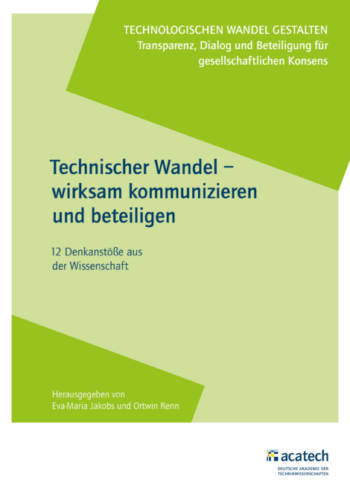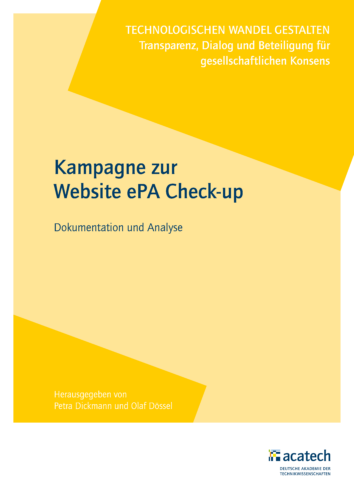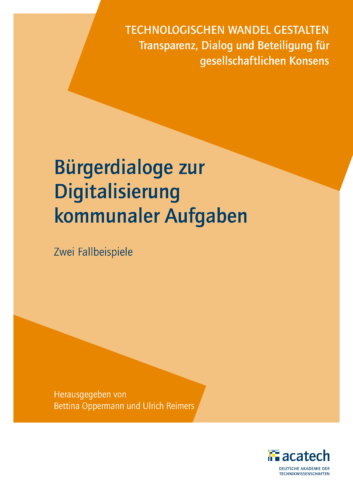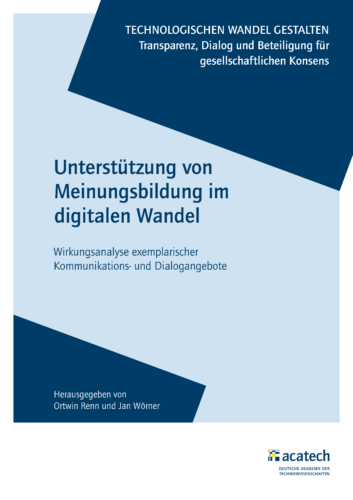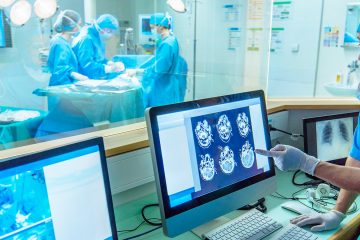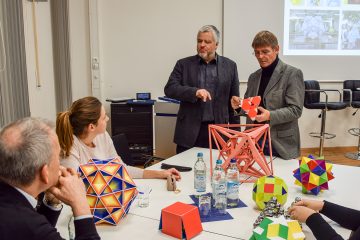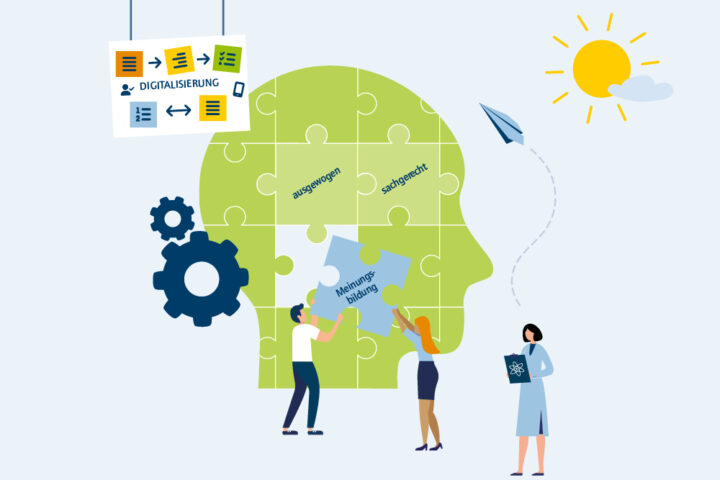Shaping technological change: transparency, dialogue and participation to bring about social consensus
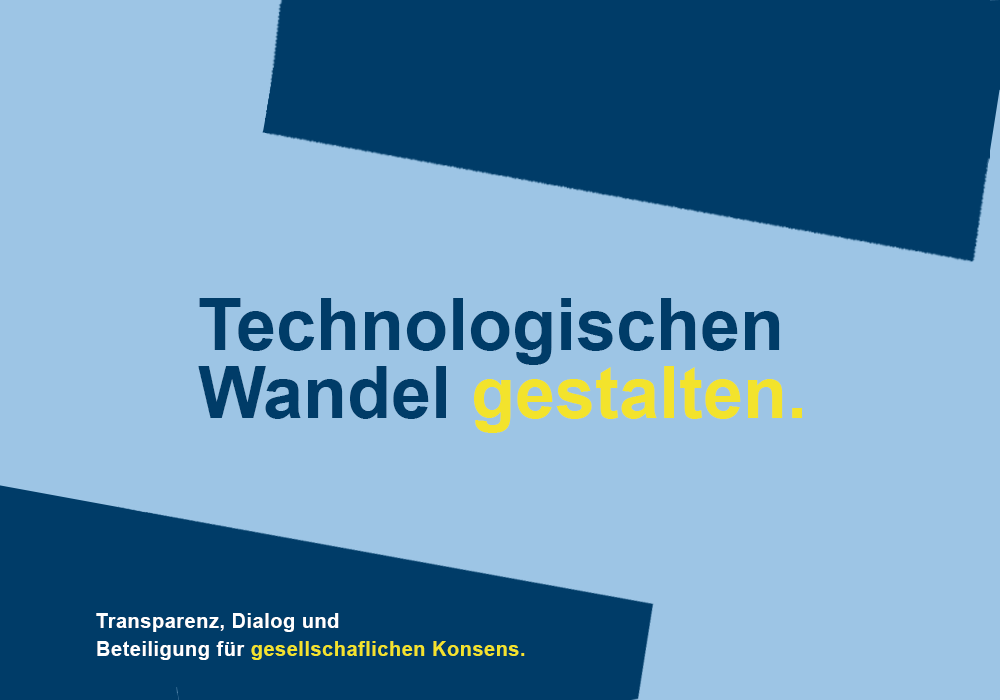
Latest project publications
Project background
Does technology cause more problems in the long term than it solves, as more than 23 per cent of respondents in the representative TechnikRadar (Technology Radar) believe? 45 per cent are undecided. The majority of Germans are ambivalent towards technological change, according to a finding of the study (TechnikRadar 2022) (in German).
Technological change is an important prerequisite for prosperity as well as environmental and climate protection. The benefit of new technologies only comes to bear when they are at least tolerated by people but better yet if they are accepted and shaped by the individual and society. So, what are the reasons for the scepticism towards technology in sections of the population – and how can it be effectively addressed? What holistic methodology and what communication formats achieve sustainable and trustworthy technology communication?
These are the key questions asked in the project “Shaping technological change: transparency, dialogue and participation to bring about social consensus”. The aim was to develop, try out as well as evaluate and measure the impact of a practicable form of technology dialogues that is grounded in science. The plan was to involve society in early, competent opinion-forming when shaping new fields of technology. Together with interested citizens, the opportunities, benefit and risks of technologies were discussed in an objective and balanced manner. The project subsequently brings the conclusions of this discussion to the attention of policy makers, industry, civil society and the individuals concerned.
Two working groups delved deeper into these initial questions and project aims within the scope of “Resilience and capacity of the digital infrastructure” and “Resilience and capacity of the healthcare system based on data availability”. They analysed current discussions in politics and society and worked up proposals for dialogue and communication initiatives that were then trialled within the project.
Key questions of the project:
- What are reasons for potential scepticism towards technology in general and in relation to certain fields of technology in sections of the population – and how can it be effectively addressed?
- In what fields of technology does NIMBYism (Not In My Back Yard) determine the path forward?
- What concerns do people have about technical developments and how can these concerns be effectively and reliably addressed in the design and communication of technology?
- What role do the media in general play in how technology is perceived, but especially social media, search engines and algorithms? How can they be a part of nuanced information as well as formation of opinion and policy concerning new technologies?
- How can filter bubbles and fake news be identified and curtailed – and how can trust in scientific evidence be built up?
- What objectives, narratives or designs for the future in relation to technological, economic and societal innovations form fertile ground for a successful dialogue about risks and benefits?
- What success factors in effective communication can be defined and derived from past examples of good practice?
- What holistic approaches facilitate effective, sustainable, trustworthy technology communication? What communication formats are suitable for what purposes and tasks?
- How can the effect of communication formats be measured and evaluated?
- How can trust in scientific evidence be built? What role does trust play in science as a requirement or parameter – and how can such trust be enhanced? What should communication and participation be like to create trust?
- What is expected of communication and political participation in relation to technological developments?
- What target groups can institutional communication reach?
- What are, and what is the role played by, conspiracy theories in the context of technological change?
Supervision
Members of the Steering Committee
Leadership
- Prof. Dr.-Ing. Jan Wörner
acatech President/Project Manager - Prof. Dr. Drs. h.c. Ortwin Renn
Former Scientific Director at the Institute for Advanced Sustainability Studies IASS (now RIFS); acatech Executive Board/Project Manager
Members of the Steering Committee
- Henry Alt-Haaker
Responsible for the department “Strategic Partnerships and Robert Bosch Academy” of Robert Bosch Stiftung GmbH - Alexander Bilgeri
Head of Corporate Communications Strategy, Messaging, Communication Channels for the BMW Group - Matthias Mayer
Head of Science, Körber-Stiftung - Lilian Knobel
Klaus Tschira Stiftung gGmbH - Dr. Karen Köhler
Bayer Science & Education Foundation ambassador - Dr. Ralf Schneider
Group CIO, Allianz SE - Sabia Schwarzer
Head of Group Communications, Branding & Corporate Affairs at Merck KGaA - Dr. Nina Smidt
Managing Director/Spokesperson of Siemens Stiftung - Richard Gaul
Member of the acatech Senate - Prof. Dr. Armin Grunwald
Karlsruhe Institute of Technology KIT; Head of the Office of Technology Assessment at the German Bundestag; acatech Executive Board - Manfred Rauhmeier
acatech Managing Director - Martina Schraudner
Scientific Director, Fraunhofer IAO | Center for Responsible Research and Innovation CeRRI
Working group 1: “Resilience and capacity of the digital infrastructure”
Digital applications are part of everyday life. They are built upon their respective digital, technical infrastructures. Germany wants to drive forward the expansion of these infrastructures. But first the population has to be consulted on matters of benefit and risk. Many municipalities and their inhabitants are undecided on what degree of digitalisation should actually be sought. To obtain more clarity, the working group “Resilience and capacity of the digital infrastructure” held civil dialogues with partner municipalities on various themes. The civil dialogues took the form of focus groups, a specific form of group discussion used in sociology research.
In Wittenberge in Brandenburg, citizens and representatives of municipal undertakings shared with the municipality their opinions and preferences in relation to the digitalisation of the administration. The municipal authorities want to use the results of these dialogues to expand their digital offerings as part of the implementation of the Online Access Act (Onlinezugangsgesetz – OZG). The focus groups were the start of a longer-term process of engagement with the population.
In Wuppertal, on the other hand, the debate centred on civil protection. In a number of groups, citizens discussed how digital technology is to be used in disasters and also how people with different levels of ability to protect themselves want to handle its use. The municipal authorities input the findings into the Smart City Strategy they were concurrently developing.
Both municipal projects were analysed to find out to what extent focus groups can contribute to objective and sound opinion forming and thus to a sensible degree of municipal technological change that is backed by the majority. The findings of the two case studies are included in two publications: the substantive results and conclusions as well as the findings in relation to the conduct of the focus groups appear in the publication “Civil Dialogues on the Digitalisation of Municipal Services. Two Case Studies” (published in German: „Bürgerdialoge zur Digitalisierung kommunaler Aufgaben. Zwei Fallbeispiele“). The findings in relation to the opinion-forming effect of focus groups as a dialogue format for technology are included in the complete project publication entitled “Supporting Opinion Formation within the Digital Transformation. Analysis of the Impact of Examples of Means of Communication and Dialogue” (published in German: „Unterstützung von Meinungsbildung im digitalen Wandel. Wirkungsanalyse exemplarischer Kommunikations- und Dialogangebote“).
Leadership of Working Group 1 (WG 1)
Members of Working Group 1
Leaders
- Prof. Dr.-Ing. Bettina Oppermann
Area of expertise: Open Space Policy and Planning Communication, Leibniz University Hannover - Prof. a. D. Dr.-Ing. Ulrich Reimers
Institute for Communications Technology, TU Braunschweig
Members of Working Group 1
- Prof. Dr. Frank Brettschneider
Dept. of. Communication Science: Communication Theory, University of Hohenheim - Prof. Dr. Achim Enders
Institute for Electromagnetic Compatibility, TU Braunschweig - Benedikt Ernst
Head of Strategy Performance Materials, Merck KGaA - Harald Geywitz
Representative Berlin Government Relations, Telefónica Germany GmbH & Co. OHG - Prof. Dr.-Ing. Helmut Holzapfel
Head, Zentrum für Mobilitätskultur Kassel - Fritz-Uwe Hofmann
Head of Public Affairs, Head of Representative Office, Deutsche Telekom AG - Prof. Dr. Alexander Lerchl
Professor of Biology and Ethics of Science & Technology, Jacobs University Bremen - Frank Ulmer
Managing Director, Kommunikationsbüro Ulmer GmbH - Dr. Mario Rehse
Head of Public Affairs, United Internet AG - Prof. Dr. Mike S. Schäfer
Department of Communication and Media Research/Institute of Communication Studies and Media Research, University of Zurich - Eva Wolfangel
Technology journalist
Working group 2: “Resilience and capacity of the healthcare system based on data availability”
The first time a patient attends a GP or consultant, they must sign a privacy policy, and for good reason: few things are as sensitive as medical data. However, digitalisation is changing the healthcare sector: more and more people are tracking their health markers in apps. This is practical – but often at the cost of handing over our own data, especially when the digital service originates in a country with poor data protection.
But aside from the risks – e.g. manipulation, theft or misuse of health data – there are many advantages to the use of health data both for the individual and the whole of society. For example, by analysing medical datasets that are as large as possible, findings can be made about medical correlations or even about rare disorders.
At the moment, digitalisation in Germany is lagging behind other countries. For that reason, health data can rarely be used for healthcare provision and research. The introduction of the electronic patient record (ePA), a digitised form of a paper patient file, is set to change data availability in the German healthcare system: everyone with health insurance will be able to use the digital record to keep and reuse their own patient data. There are also plans for the patient to be able to make their own data available to medical research through the ePA. However, according to a survey by acatech and Körber-Stiftung (in German), only a small percentage of the population is aware of this possibility or opts in.
The work of WG 2 aimed to intensify the societal discourse on the use of health data based on the example of the electronic patient record. In focus groups, a form of group discussion used in sociology, experts and non-experts were asked about attitudes, needs, hurdles, risks and opportunities in relation to the ePA. The website ePA Check-up (in German) is a digital guide that is designed to help citizens form an objective opinion on the electronic patient record by informing them about the risks and opportunities in a balanced way. The ePA Check-up was evaluated and its influence on the opinion of the users measured. The results of the focus group discussions as well as the evaluation and measurement of impact are included in the complete project publication entitled “Supporting Opinion Formation within the Digital Transformation. Analysis of the Impact of Examples of Means of Communication and Dialogue” (published in German: „Unterstützung von Meinungsbildung im digitalen Wandel. Wirkungsanalyse exemplarischer Kommunikations- und Dialogangebote“). The success of the marketing campaign is discussed in the publication entitled “Campaign for Website “ePA Check-up”. Documentation and Analysis”, which has already been published (in German: „Kampagne zur Website ePA Check-up. Dokumentation und Analyse“).
Leadership of Working Group 2 (WG 2)
Members of Working Group 2
Leaders
- PD Dr. med. Dr. phil. Petra Dickmann
Klinik für Anästhesiologie und Intensivmedizin, Public Health department, Jena University Hospital - Prof. Dr. Olaf Dössel
Institute of Biomedical Engineering at the Karlsruhe Institute of Technology KIT
Members of Working Group 2
- Daniel Bahr
Board member Allianz Private Krankenversicherungs-AG, former federal minister - PD Dr. Gaby-Fleur Böl
Head of the Risk Communication department, German Federal Institute for Risk Assessment (BfR) - Franz-Helmut Gerhards
Chief Digital Officer, DAK-Gesundheit - Prof. Dr.-Ing. Horst Hahn
Director of the Fraunhofer Institute for Digital Medicine MEVIS; Working group Digital Medicine, Faculty 3, University of Bremen - Dr. Friederike Hendriks
Junior Research Group lead “Communicating Scientists: Challenges, Competencies, Contexts (fourC)”, TU Braunschweig - Michael Heutmann
Managing Director BITMARCK Service GmbH - Dr. Karen Köhler
Vice President, Head of R&D & Science Engagement, Bayer AG - Prof. Dr. Cordula Kropp
Chair of Sociology specialising in risk and technology research, University of Stuttgart; Director of the Center for Interdisciplinary Risk and Innovation Studies at the University of Stuttgart (ZIRIUS) - Nicola Kuhrt
Medical journalist - Prof. Dr. Jörn Müller-Quade
Chair of Cryptography and Security, Karlsruhe Institute of Technology KIT - Dr. Bernd Ohnesorge
President Europe, Middle East & Africa, Siemens Healthineers - Prof. Dr. Hermann Requardt
acatech Executive Board - Prof. Dr. Indra Spiecker known as Döhmann
LL.M., Chair in Public Law, Information Law, Environmental Law and Legal Theory, Goethe University Frankfurt - Prof. Dr. Christiane Woopen
Heinrich-Hertz Professorship in ‘Life Ethics’ in the Transdisciplinary Research Area “Individuals, Institutions and Societies”, University of Bonn
Communication Science Expert Group (WG 0)
The Communication Science Expert Group (WG 0) comprised experts from science and technology communication, technology assessment, psychology, evaluation as well as the practice of science communication. It supported the two working groups, inputting findings on communication science and identifying cross-cutting results of the working groups.
Furthermore, the experts addressed key issues of relevance to society in the context of current technology communication. Their input informed the publication entitled “Technological Change – Effective Communication and Participation. 12 Items for Consideration from the Research” (published in German: „Technologischer Wandel – wirksam kommunizieren und beteiligen. 12 Denkanstöße aus der Wissenschaft“). This volume is targeted at institutions and organisations that already engage in or are planning science-based communication and participation procedures in relation to technology with a focus on new technology applications.
Members of the Communication Science Expert Group (WG 0)
Leaders
- Prof. Dr. Eva-Maria Jakobs
Director of the Human-Computer Interaction Center, Teaching and Research Area Text Linguistics and Technical Communication, RWTH Aachen University - Prof. Dr. Drs. h.c. Ortwin Renn
Former Scientific Director at the Institute for Advanced Sustainability Studies IASS; acatech Executive Board/Project Manager
Other members of the Communication Science Expert Group
- Prof. Dr. Martin W. Bauer
Director of MSc Social & Public Communication, Professor of Social Psychology & Research Methodology, Department of Psychology and Behavioural Science, London School of Economics and Political Science - Prof. Dr. Stefan Böschen
Society and Technology Chair, RWTH Aachen - Prof. Dr. Frank Brettschneider
Dept. of Communication Science: Communication Theory, University of Hohenheim - Sen.-Prof. Dr. Rainer Bromme
Institute for Psychology, University of Münster - Richard Gaul
Member of the acatech Senate - Prof. Dr. Armin Grunwald
Head of the Institute for Technology Assessment and Systems Analysis at the Karlsruhe Institute of Technology; Head of the Office of Technology Assessment at the German Bundestag; acatech Executive Board - Prof. Dr. Nina Janich
German Studies – Applied Linguistics, Technical University of Darmstadt - Prof. Dr. Cordula Kropp
Chair of Sociology specialising in risk and technology research, University of Stuttgart; Director of the Center for Interdisciplinary Risk and Innovation Studies at the University of Stuttgart (ZIRIUS) - Beatrice Lugger
CEO and Director, Nationales Institut für Wissenschaftskommunikation (NaWik) - Prof. Dr. Frank Marcinkowski
Chair of Communication and Media Studies I, Heinrich Heine University Düsseldorf - Prof. Dr. Hans Peter Peters
Honorary professor at the Institut für Publizistik- und Kommunikationswissenschaft, Freie Universität Berlin - Dr. Christian Rauch
Founder and Managing Director, STATE - Prof. Dr. Lucia A. Reisch
El-Erian Professor of Behavioural Economics and Policy and Director of the El-Erian Institute, University of Cambridge; Fellow, Queens’ College Cambridge - Prof. Dr. Mike S. Schäfer
Department of Communication and Media Research/Institute of Communication Studies and Media Research, University of Zurich - Dr. Dagmar Simon
Managing Director EVACONSULT; Guest of the Research GroupDigital Mobility and Social Differentiation, Berlin Social Science Center - Prof. Dr. Helmuth Trischler
Head of research, Deutsches Museum
Socio-political Advisory Group
The Socio-political Advisory Group was made of up representatives of different views in society, including science, enterprise, associations and media, who discussed the shift in and the development of society in the context of technological progress. The Advisory Group served as a sounding board for project work.
Members of the Socio-political Advisory Group
Leaders
- Eva Maria Welskop-Deffaa
President of Deutscher Caritasverband e.V. - Ulrich Wilhelm
Chairman of the FAZIT-Stiftung
Members of the Socio-political Advisory Group
- Prof. Dr. Alexandra Borchardt
Media scientist and author - Friederike Fabritius
Neuroscientist and leadership expert - Dr. Stefan von Holtzbrinck
Publisher, CEO of Holtzbrinck Publishing Group - Markus Jerger
Former President of the European Entrepreneurs Association - Prof. Lutz Eckstein
President of the Association of German Engineers (VDI) - Prof. Dieter Kempf
President of the Federation of German Industries (BDI), 2017-2020 - Prof. Dr. Renate Köcher
Managing Director of the Allensbach Institute (Institut für Demoskopie Allensbach) (IfD) - Prof. Dr. Carsten Könneker
Director of the HITS-Stiftung - Jörg-Andreas Krüger
President of NABU Nature And Biodiversity Conservation Union (Naturschutzbund Deutschland e.V.) - Dr. Sicco Lehmann-Brauns
Director Research and Innovation Policy Siemens AG/Corporate Technology - Matthias Mayer
Head of Science, Körber-Stiftung - Dr. Bernhard Rohleder
CEO of Bitkom e.V. - Maximilian Schöberl
General representative, BMW AG - Dr. Nina Smidt
Managing Director/Spokesperson of Siemens Stiftung - Prof. Dr. Katharina Theis-Bröhl
Professor of Physics in the study programmes Sustainable Energy and Environmental Technologies as well as Process Engineering and Energy Technology - Prof. Dr. Dr. Johannes Wallacher
President of Munich School of Philosophy
Project members worked in the project groups on a voluntary basis and may also have done contract work as part of the project.


